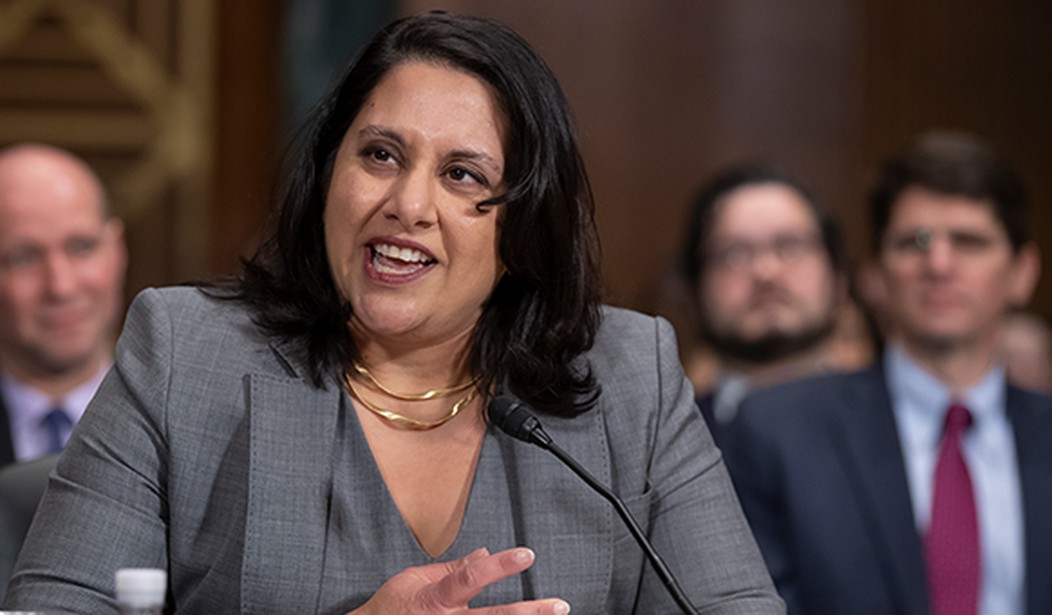There are many reasons the Senate should confirm Neomi Rao to the Court of Appeals for D.C. Circuit seat left vacant by Brett Kavanaugh’s elevation to the Supreme Court. She may very well be the cream of President Trump’s excellent crop of nominees to the federal judiciary. But it is her impressive scholarly writing on “dignity” that make her nomination timely – and especially worthy of quick Senate confirmation.
Rao’s not talking about “dignity” in the everyday sense of the term (one’s manner of being). What Rao has written about is the judicial or constitutional concept of dignity. That is,the type of respect a person can demand from others and from the state.
Rao’s knowledge of U.S. constitutional law and her concern that federal courts decide cases with absolute commitment to the rule of law are on impressive display in her 2011 Notre Dame law Review article, “Three Concepts of Dignity in Constitutional Law.” Over almost 100 pages of meticulously cited legal scholarship, Rao marshals political theory and philosophy to identify the differing concepts of “dignity” used by courts. “[T]he meaning of dignity matters, because it is an interpretive principle used to understand rights and liberties,” Rao explains. “Separating out and explaining the various meanings of dignity reveal their fundamental differences and should provide greater transparency about what courts are doing when they invoke dignity."
Unlike too many legal scholars today, Rao does not promote ideological positions. Rather, she sets forth a framework for applying and defending a concept of dignity consistent with American constitutional traditions. After examining specific court cases involving individual privacy, the right to self-representation, sexual autonomy, free speech and race and gender equality, Rao argues that we should adhere to the American constitutional law tradition that has primarily emphasized the intrinsic human dignity that promotes liberty and autonomy or “the dignity of the individual demanding a certain freedom and space from government interference.”
Recommended
Rao also explains that such intrinsic dignity, based on the idea that all people are owed a certain degree of respect, is not an American invention. No, the sources of this concept of intrinsic dignity find roots in classical Greek and Roman thought as well as the Judeo-Christian tradition that “[e]ach person possesses dignity by virtue of his relation to the divine.”
It’s a profound argument, built on Rao’s extensive research. It’s also a timely one, since more and more courts are resolving cases on the basis of dignitary interests. A Judge Rao would elevate this judicial conversation.
And she is beyond qualified for a seat on the D.C. Circuit. The daughter of Indian immigrants, Rao has an impressive educational pedigree. She graduated from Yale University in ethics, politics, economics and philosophy with the highest distinction. She then went on to the University of Chicago Law School. Upon graduation, she was named a member of the Order of the Coif, an honors society for graduates in the top ten percent of his or her class. Rao clerked for Fourth Circuit Court of Appeals Judge Harvey Wilkinson, III and then Supreme Court Associate Justice Clarence Thomas.
After some time in private practice, Rao entered public service working in the White House counsel’s office and as a staffer on the Senate Judiciary Committee. She then taught at George Mason’s Antonin Scalia Law School. While there, she founded the Center for the Study of the Administrative State. Rao currently serves as administrator of OMB’s Office of Information and Regulatory Affairs
In short, few lawyers today have Neomi Rao’s breadth of professional experience.
The D.C. Circuit is arguably the most important, the most prestigious, federal court of appeals. It has sole responsibility for deciding cases dealing with decisions made by federal agencies affecting health care, national security, environmental and consumer protections and workplace safety. Four of the nine sitting justices on the U.S. Supreme Court -- Chief Justice John Roberts and Associate Justices Clarence Thomas, Ruth Bader Ginsburg, and Brett Kavanaugh -- are alumni of this court.
It important then that senators roll up their sleeves and take up their “advise and consent” responsibility on Rao’s nomination. This should not be difficult. Neomi Rao will add even more dignity to the D.C. Circuit Court of Appeals.

























Join the conversation as a VIP Member